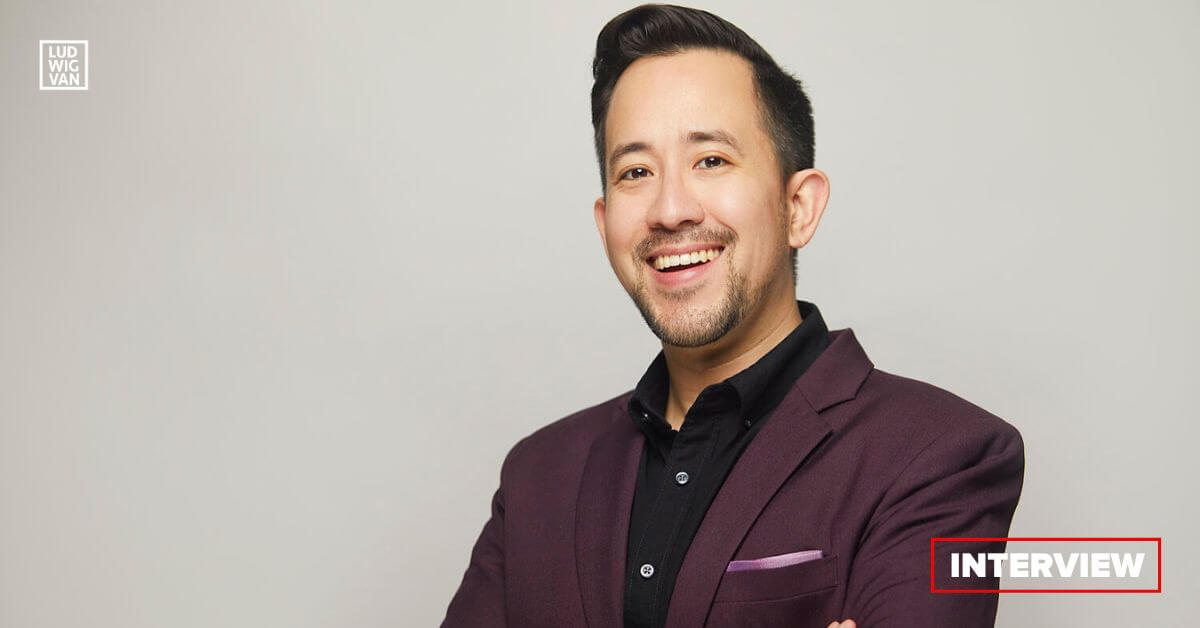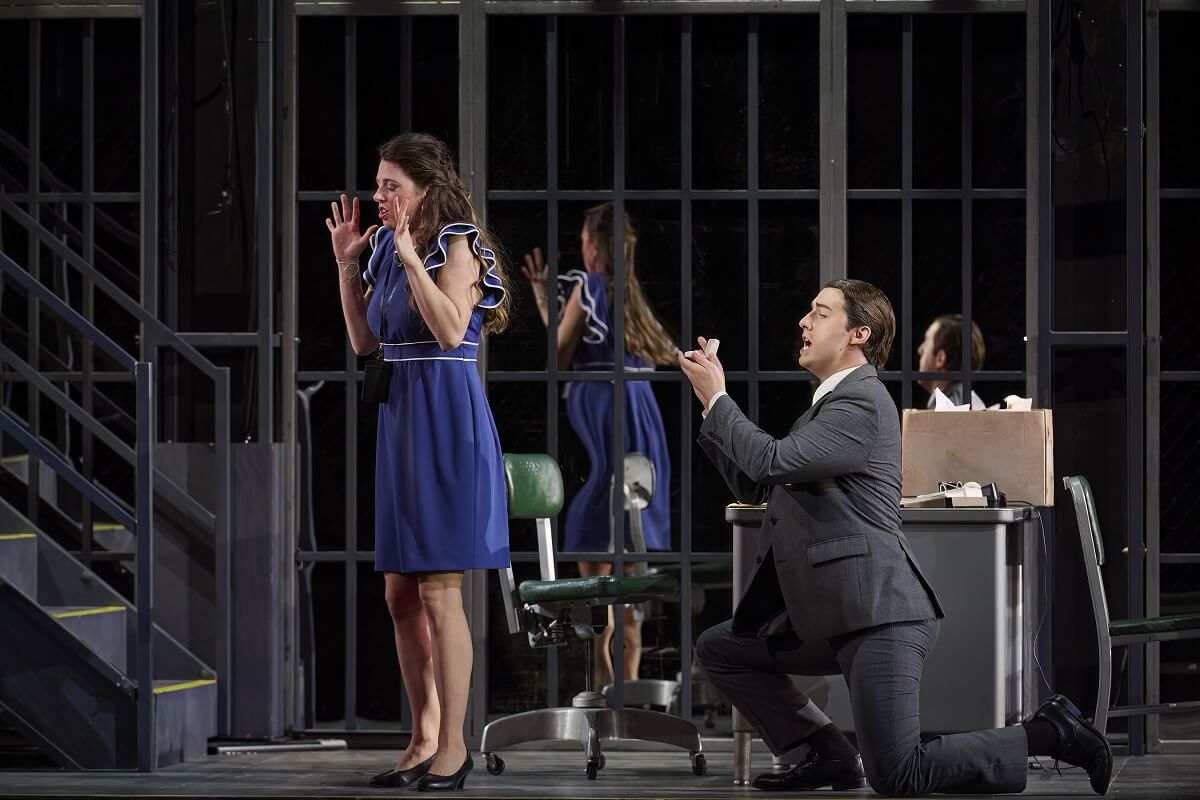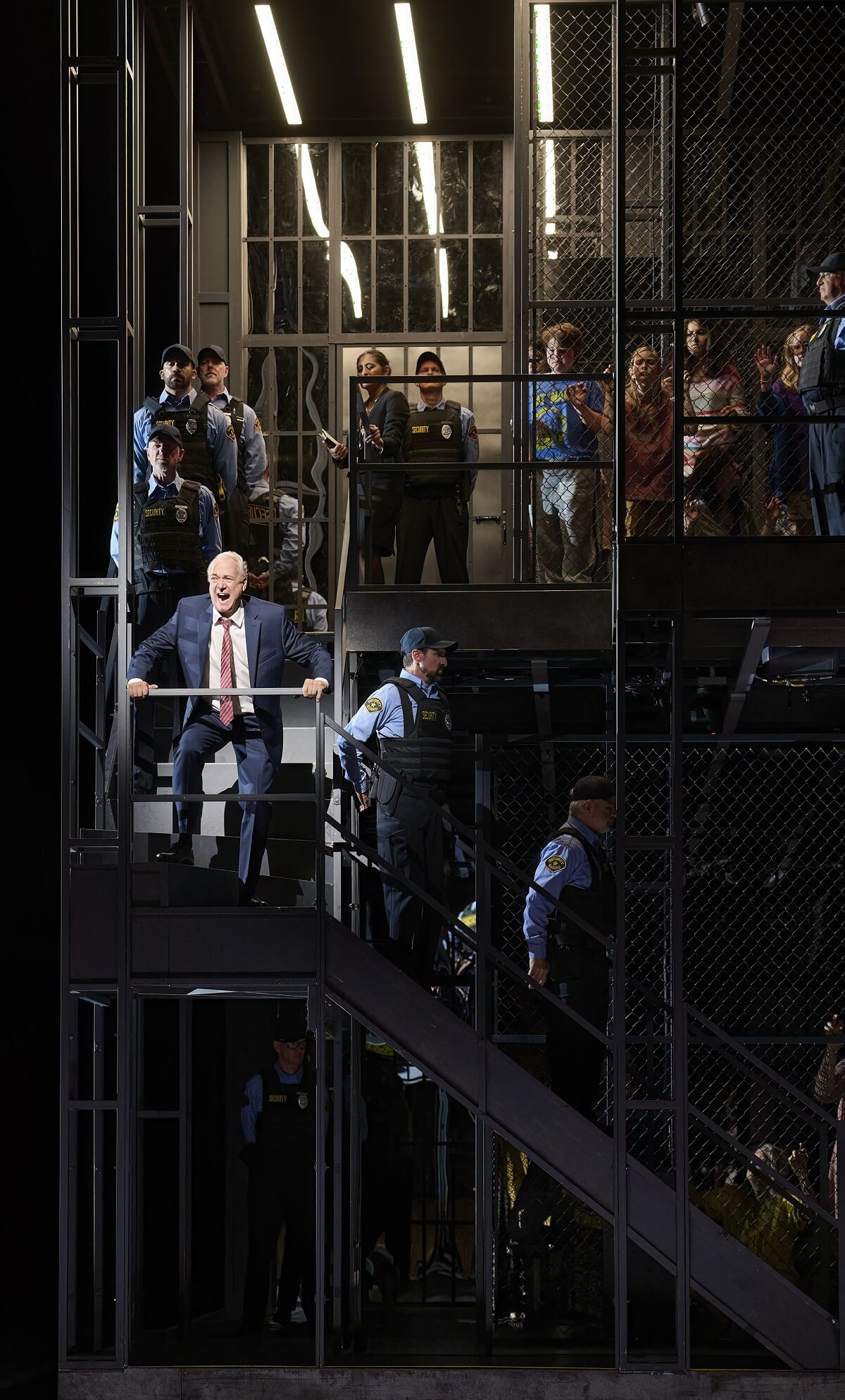
Matthew Ozawa will be directing the Canadian Opera Company’s production of Fidelio, Beethoven’s only opera, from this evening’s opening till October 20. It’s a production he originated with the San Francisco Opera.
Beethoven’s only opera returns to the COC after a hiatus of nearly 15 years in Ozawa’s brand new vision. Beethoven’s story follows a woman protagonist who tries to free her husband from unjust imprisonment. She disguises herself as a man, and takes the name Fidelio.
The themes of political prisoners and wrongful incarceration, revolving around the abuse of power and violence, resonate strongly in the present day. That’s where Ozawa has set the story, in a modern detention centre. Through it, he explores the layers of bureaucracy that work to imprison human beings within a system.
Matthew Ozawa
Matthew is Chief Artistic Administration Officer at Lyric Opera of Chicago, as well as a busy Stage Director. He also has a passion for arts education, and has taught at the University of Michigan, School of Music at DePaul University, and other institutions. He is founder and Artistic Director of Mozawa, a Chicago-based incubator advancing collaborative art and artists.
His earliest background in the field is in instrumental music, having studied the clarinet at the local conservatory. “I’m a musician to the core of my soul,” he says.
His services as a stage director are in demand. Since the spring, he’s directed Roméo et Juliette in San Antonio, a production he’ll take up again in Kansas City in March 2024, along with Madama Butterfly in Detroit (and again in Pittsburgh, simultaneous to the COC), before making his way to Toronto for Beethoven’s Fidelio. The Butterfly production is new.
“I’m juggling between repertoire, and I’m juggling between projects,” he says.
Matthew truly began to work in opera from the ground up, first as a technical apprentice with the Santa Fe Opera. He’s also served in roles such as Stage Manager, Assistant Dramaturge, and others with many companies across North America, including the COC in previous years. In terms of projects, his repertoire as stage director includes traditional opera favourites along with new work. He is known for his innovative vision for operas both new and old.
An opera has to speak to him, with his unique lens as what he calls a third culture kid. He is Japanese-American, but grew up in Singapore. “I think I see things differently,” he says.
“I am always intrigued by stories that provide possibility,” Matthew explains. “I’m always focused on the distillation of character.”

Fidelio: The Production
The set involves an appropriately bleak aesthetic, with steel cages and industrial lighting, and television screens.
“Something that I realize I have become known (for) one is as a minimalist, although Fidelio is anything but,” he laughs, “it’s very much maximalist. But, having been in the industry 28 years, I am very much looking to look at classical or traditional repertoire through a new lens.”
“I tend to be a minimalist,” he explains. That typically involves distilling the concept to its essential elements with clean lines. In Fidelio, though, he was attempting to create a realistic depiction of cold bureaucracy at work.
“The set is basically a cube,” he describes. The various sides of the cube, as it revolves, show the different aspects of the bureaucratic system as they process prisoners and take away their freedom. The audience sees what happens behind closed doors along with what is public. The cube becomes the basement dungeon in Act II.
What began as a simple design soon began to accumulate details, and ended up filled with hundreds of props to create a realistic warehouse basement.
Ozawa and Fidelio
Matthew begins by finding a kind of core, a seed of the project that unify every other aspect of the production. There’s no shortage of strong themes in Beethoven’s opera.
“When I was asked to do Fidelio, I was slightly nervous about it.” The California premiere was set to open during the 2020 American federal elections… perhaps not the most favourable political climate for a story about revolution. “Obviously it’s about the power of humanity to fight against tyranny and injustice.”
With dialogue interspersed with the music, it was important to find the right singers. The dramatic arc is also crucial to construct in the middle of all the larger themes. As he points out, Beethoven’s story begins with a kind of domestic comedy, with nods to Mozart in the music. “It misleads you to think that the whole opera will be that way.” As the story unfolds, both the music and the plot darken. “There’s the brass chords, the diminished chords, the orchestration — the unpredictability of where the music ends up — I find that fascinating.”

Rehearsals continued in San Francisco during the pandemic, with the huge cast fully masked. “It was a very lengthy rehearsal period,” he recalled. The atmosphere, when sanctions were finally lifted and it was performed on stage, was still somewhat fraught. “There was trepidation and nervousness.”
Beethoven’s triumphant ode to freedom at the end, however, rang with particular resonance.
He’s bringing what he learned from the experience to Toronto. “I did learn a lot from the first go around,” he says. That includes a new lighting designer, and an all-new cast. “It’s been really wonderful re-exploring (it).”
In consultation with Maestro Debus, he’s also changed the ending for the Canadian production. “We decided to go in to a slightly different direction,” he says.
Opera is Universal
Opera intrigues Ozawa on several levels. “I think in many respects, it’s universal,” he says, “because it’s a synthesis of all the art forms.” It seems to be able to convey common human truths in broad terms. “At the core, these are human stories.”
In Fidelio, it’s Leonore’s journey that takes audiences into the human element of the politics. “There is something about watching Leonore’s journey, to witness what she witnesses, and continue to go forward, that is very revolutionary.”
He points out Beethoven’s innovation in putting a woman at the centre of the story as an active heroine. “She’s a role model for anybody.”
“Unfortunately, what she experiences […] this is the nature of individuals being unjustly imprisoned. Unfortunately, it’s a cycle. It’s pervasive throughout history,” he says. That’s what gives it a universal appeal.
“The piece itself has always served as a symbol of hope for people afflicted by tyranny.” He points out it was performed in defiance of Napoleon, in Austria during the Nazi Occupation, and in Soviet Russia. “I always say that when Beethoven performed this piece, he put it in the period he lived in.” That gave it contemporary immediacy. “That is what I carry forward now.”
Imprisonment is also a theme that touches Matthew on a personal level.
He is a fourth generation Japanese-American, his family among the first wave of Japanese immigrants to the US West Coast. Yet, his father was born in an internment camp in Wyoming during the Second World War, one of many under the system established by Franklin D. Roosevelt.
While he was still in the conceptual stage of creating the production, Matthew would look at the images of the adults and children interred at refugee camps at the Mexican border. Ironically, he says he noticed that an old Japanese internment camp had been reopened to accommodate the Mexican children. “That was so very striking,” he says. “We had to speak to the moment.”
He’s got the composer’s original inspiration at heart. “Beethoven as a revolutionary.”
Tickets for the opera, which opens tonight and continues to October 20, and more information, available [HERE].
#LUDWIGVAN
Get the daily arts news straight to your inbox.
Sign up for the Ludwig van Daily — classical music and opera in five minutes or less HERE.
- INTERVIEW | Cultureland Presents A New Opera Steeped In Iranian Culture: Echoes Of Bi-Sotoon - May 10, 2024
- PREVIEW | Tapestry Opera Presents An Acadian Kitchen Party & Iron Chef Inspired Operatic Adventures To The Stage - May 9, 2024
- THE SCOOP | The Royal Conservatory Makes Koerner Hall More Accessible With My Piece Of The City Program - May 9, 2024



